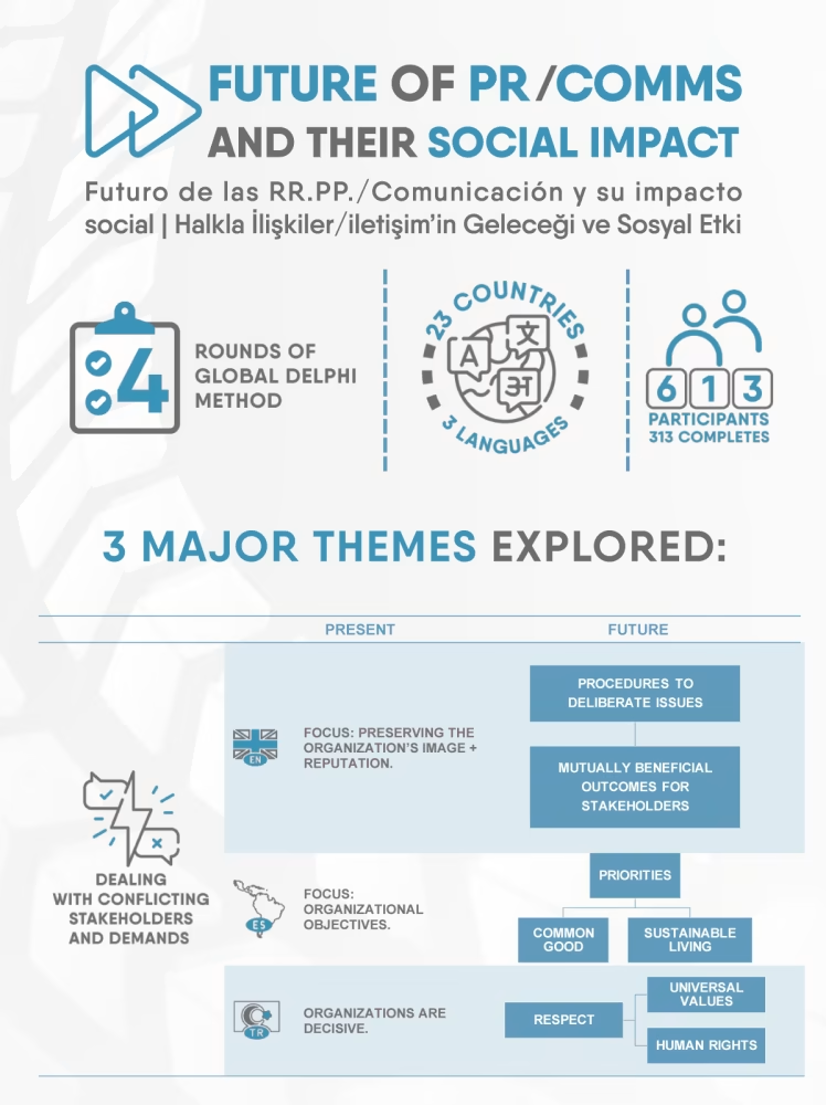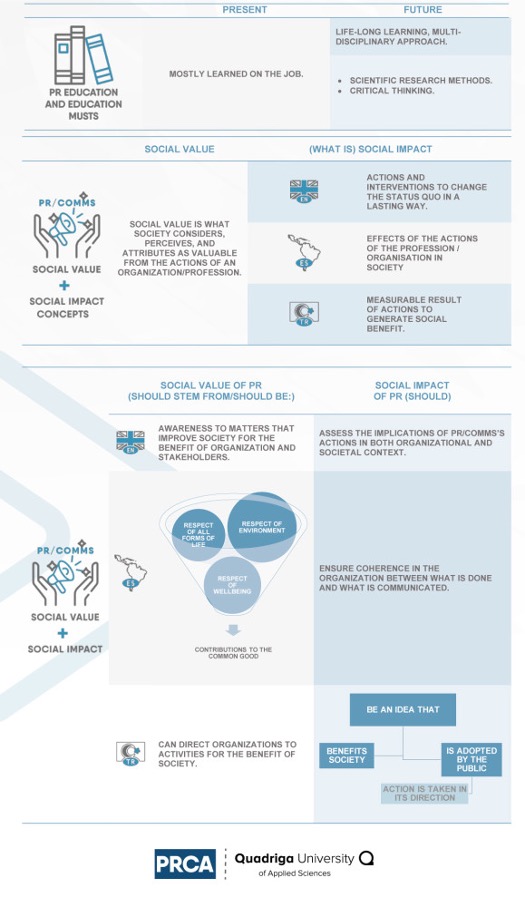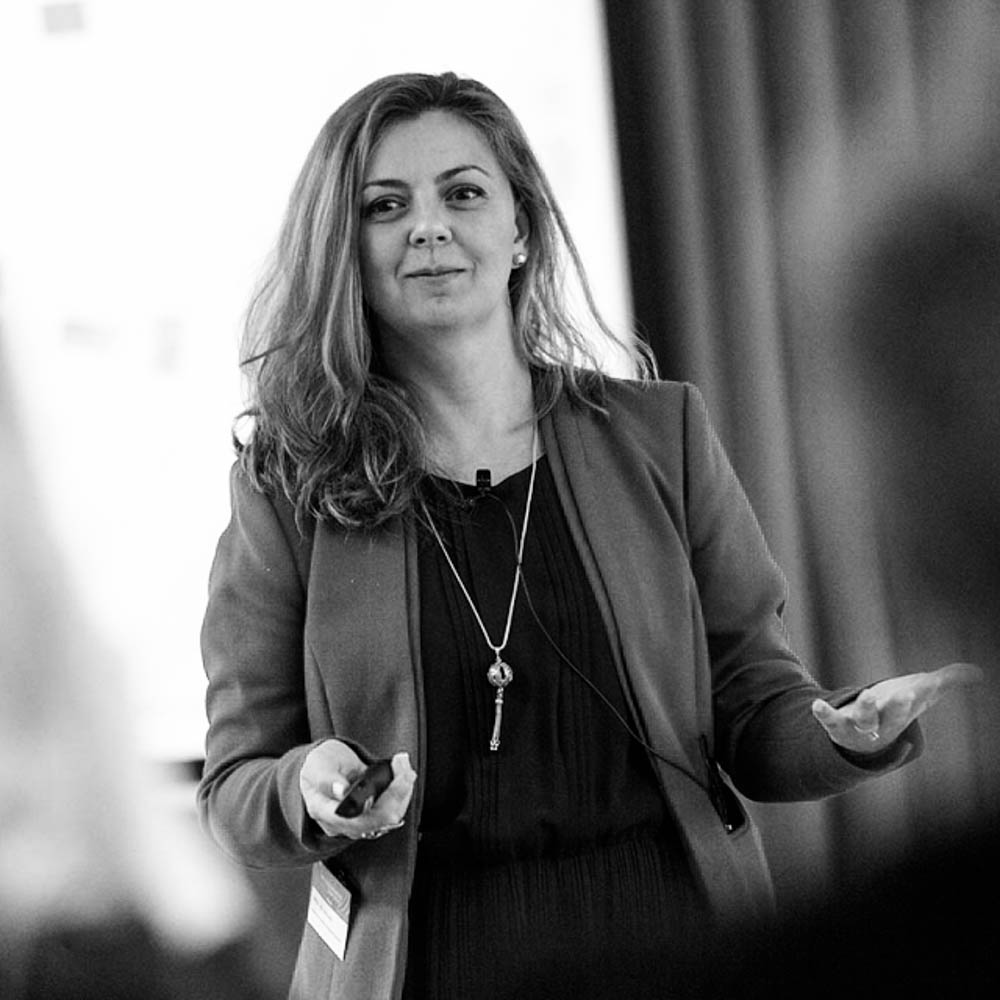
The future of PR is… …wide open, and to be made by us
Turbulent times require calm and collected communicators. Our troubled, post-COVID, conflict- and crisis-ridden times are thus often described as an opportunity for effective communicators to build better relations between organisations and their stakeholders. At the same time, polarised partisan public spheres are often blamed on communicators with bad (or at least biased) intentions. As so often with complex issues, both these observations can be true at the same time, depending on context.
Dr. Adi and I are both, to varying degrees, academics, practitioners, and practical educators in the field of PR. Over the last six years, we have collaborated on a number of research projects which can all be boiled down to a core question: how do we teach and practice socially responsible public communication?
In 2019, we co-edited a special issue of ESSACHESS Journal for Communication Studies on the Future of Communications and Public Relations (PR). (Re)Imagining the Role, Function and Purpose of the Communication Profession with contributions by Jim Macnamara and Marina Vujnovic and Dean Kruckeberg, among others. For the 2022 Routledge Companion to Public Relations, we wrote a chapter on Public Relations as responsible persuasion.
This led us to the idea for the Future of PR/Comms and their Social Value study: we wanted to hear how other academics-practitioners-educators around the world saw the present and future challenges and opportunities for the field. And we wanted to do that in a way that wouldn’t just replicate findings from other studies which are usually based either on standardised questionnaires, or on deep dive interviews with very small sample sizes.
To ensure diverse, global representation as well as scope for reflective insights, we devised a labour-intensive Delphi Study with two qualitative and two quantitative rounds with global participation: with the help of 36 research partners across 23 countries and three languages (English, Spanish and Turkish), the research process was co-created and tested, and more than 600 participants were engaged in the study between November 2022 and April 2023. The final report, which was published on 18th September, contains findings from 313 participants who completed all four rounds of the study.
The study focuses on three main areas:
— Dealing with conflicting stakeholders and demands
— PR education
— Concepts of social value and social impact
We encourage everybody to read the entire study (links to the English and Spanish version can be found at the end of this post).
For a brief summary, former CIPR president and Ketchum Chief Engagement Officer Stephen Waddington’s blog post is recommended. His main takeaways:
1.) Contribution to management
Historically public relations practice has focused more on tactical execution versus strategic decision-making. However, participants emphasised that public relations practitioners need to influence management to help ensure business activities align with organisational values and social purpose.
2.) Alignment of activities and values
A key opportunity participants identified is helping close the gap between what organisations say and what they do. The insight of public relations into stakeholder perceptions can aid leaders in diagnosing when misalignments emerge between activities and values. Practitioners can advise on communications and business solutions to realign words and deeds.
3.) Measuring impact in terms of social outcomes
Too often, public relations activity has focused on outputs like impressions and awareness. Participants argued for prioritising real social outcomes like behavioural changes, attitudes, and policies. This requires identifying key social performance indicators and monitoring progress toward those versus vanity metrics.
4.) Focusing on listening versus broadcast
Messaging without meaningful listening risks missing the mark. Participants advocated for more two-way engagement centred on understanding stakeholder needs and co-creating solutions. This involves extracting insights from stakeholders and involving them directly in ideation and decision-making processes.
5.) Developing stronger ethics, critical thinking, and analytical skills
Participants highlighted the need for enhanced training in ethics, critical analysis, and reasoning to guide socially responsible practice. This helps practitioners better anticipate and address issues around manipulation, propaganda, and unintended consequences.
Our main takeaway – from practical and academic experience, from many conversations, and last but not least, from this research – is that the future of PR is made by those who learn, teach, and practice it. The more we listen to, and learn from each other, the better the chances for a bright, successful, socially inclusive, and valuable future.
The findings of this study – so many comments in multiple languages from the initial two qualitative rounds, plus data from the two quantitative rounds – are currently being further explored and analysed, and will hopefully lead to a range of publications, as well as further research – globally, regionally, and by country. This is very much meant to contribute to the ongoing discourse in PR and communications about right and wrong, responses to challenges, ways forward. Nobody has complete answers, but we can challenge each other to ask better questions and invest more time and energy in finding better answers. We hope that this challenge will be taken up by many. We look forward to hearing from and engaging with you!



Thomas Stoeckle is a Course Leader at Bournemouth University and has an AMEC International Certificate in Measurement and Evaluation at PR Academy Ltd. Stoeckle is a member of the IPR Measurement Commission.

Dr. Ana Adi is a digital humanist and public relations consultant. Her work in recent years has been mostly focused the future of PR, gendered views of PR, (digital) storytelling, and public relations insight, evaluation and measurement, and CSR. She is a member of the IPR Measurement Commission.



